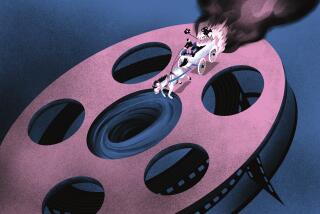Denis Leary’s Depth Anchors Tense ‘Final’
- Share via
In the timely and scary “Final,” Denis Leary gets the chance to give the major dramatic performance that one sensed he was capable of since he emerged as a comedian and actor.
Leary combines unintimidating, easy to identify with looks and manner with a talent that ranges widely and deeply. He surprises us with his passion, intellect and emotion; he can be charming or menacing--or both at the same time, as is the case in “Final.”
Leary plays Bill, a musician who wakes up to find himself, with his memory impaired, in the psychiatric wing of a Connecticut hospital. In the first of many flashbacks as tantalizing to us as they are to him, he envisions himself behind the wheel of his beloved ’53 Ford truck careening through a rock quarry. In time, Ann (Hope Davis), the young psychiatrist assigned to treat him, tells him he apparently drove off a cliff into the quarry. In connecting the images that flash in Bill’s mind, he is drunk, grief-stricken by the death of his beloved father.
Bill is certain that he is about to be killed by a lethal injection and is determined to escape from the hospital.
Because Ann reminds of him of his former fiancee, and because he and Ann are smart, good-looking young people, they are mutually attracted and soon Bill, even as his memory remains impaired, tries to persuade her to leave with him.
Debut screenwriter Bruce McIntosh, adapting his play, and debut solo director Campbell Scott have more in mind than a mental hospital romance, and indeed their drama takes place in a larger context, one that won’t be spelled out but which touches on patients’ rights in medical science.
Their film gains even greater significance in the recent anthrax scare and the troubling civil rights issues raised by the attorney general’s post-Sept. 11 anti-terrorist policies.
Ultimately, “Final” turns on the eternal question of how to balance the welfare of the many and that of a single individual and the consequences of doing so.
Because “Final” raises so many complex emotional and moral issues and relies considerably on the viewer to piece together the shards of memory that haunt and torment Bill, it is wise that Scott adopts a style of Yankee simplicity to unravel so tricky a plot. (It is hard to imagine how “Final” would work onstage at all.)
Shot digitally, “Final” is less than terrific technically; focus and sound levels waver. Luckily, these flaws are not inconsistent with the film’s raw, unvarnished tone and they do not diminish the effect of Leary’s performance or that of Davis, whose ability to hold much in reserve is crucial to the effectiveness of Leary’s portrayal and to the film itself.
*
Unrated.
‘Final’
Denis Leary...Bill
Hope Davis...Anne
J.C. MacKenzie...Todd
Jim Gaffigan...Dayton
The Independent Film Channel presents an InDigEnt Production, in association with Spare Room Productions, released by Cowboy Pictures and Lions Gate Films. Director Campbell Scott. Producers Gary Winick, Alexis Alexanian, Mary Frances Budig, Steve Dunn, Campbell Scott. Screenplay by Bruce McIntosh. Cinematographer Dan Gillham. Editor Andy Keir. Costume designer Toni Fusco. Music Guy Davis. Production designer Chris Shriver. Art director John Brainard. Running time: 1 hour, 51 minutes.
In limited release.
More to Read
Only good movies
Get the Indie Focus newsletter, Mark Olsen's weekly guide to the world of cinema.
You may occasionally receive promotional content from the Los Angeles Times.










